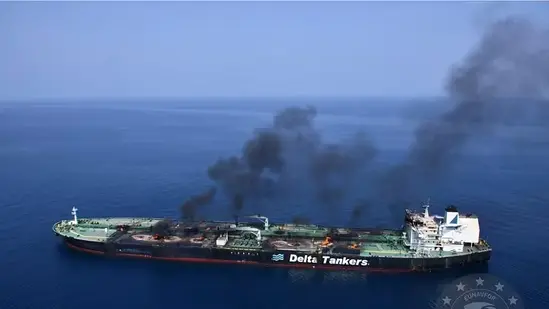In a series of escalating maritime assaults, Yemen’s Houthi rebels claimed late Monday responsibility for attacks on the Panama-flagged tanker Blue Lagoon I using multiple missiles and drones. The Houthis’ statement, however, made no mention of the Saudi-flagged supertanker Amjad, which was also targeted in the same incident.
The attacks occurred on September 2, 2024, in the Red Sea off the coast of Yemen. According to sources familiar with the situation, the two tankers, which were sailing in close proximity, were hit but sustained only minimal damage. There have been no reported casualties from the incident.
The European Union’s Operation Aspides naval force released a photograph showing the Greek-flagged oil tanker Sounion burning in the Red Sea, a result of the Houthis’ strikes. This image underscores the severity of the ongoing maritime threat posed by the rebels.
The Blue Lagoon I, managed by Greek company Sea Trade Marine SA, is a Suezmax tanker with a capacity of up to 1 million barrels. Despite sustaining three ballistic missile hits, the Joint Maritime Information Center (JMIC), operated by international naval forces, reported that the vessel was able to continue its voyage without requiring assistance.
The center noted that the attack was possibly linked to other vessels within the Blue Lagoon I’s company structure making recent port calls in Israel. On the other hand, the Saudi-flagged Amjad, owned by the Saudi national shipping group Bahri, was also involved in the incident.
With a maximum capacity of 2 million barrels, the Amjad was reportedly sailing near the Blue Lagoon I but seems to have been less directly targeted. The supertanker did not sustain major damage, and its owner has yet to provide an official statement regarding the attack.
Saudi Arabia, the world’s leading oil exporter, has been increasingly concerned about Houthi missile attacks in the Red Sea, which have threatened shipping lanes crucial to global oil supply.
The kingdom has been grappling with a complex and ongoing conflict in Yemen, where the Houthis, backed by Iran, have frequently targeted both Saudi and international interests.
Since November, the Houthis have carried out over 70 attacks on maritime vessels in the region. These strikes have included the sinking of two ships, the seizure of another, and the deaths of at least three seafarers.
The Houthis claim their actions are in solidarity with Palestinians amid the Gaza conflict, a rationale that has not quelled the international community’s growing concerns.
The latest attacks highlight the continued volatility in the Red Sea, a vital maritime route for global trade. Despite the minimal damage reported, the incident underscores the persistent threats facing commercial shipping in the region and the broader implications for international maritime security.

